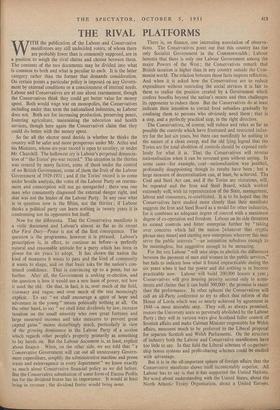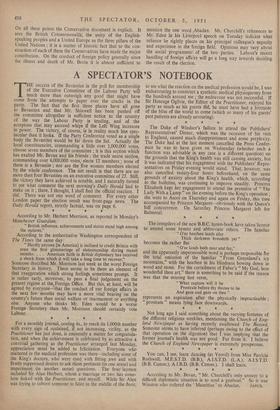THE RIVAL PLATFORMS
WITH the publication of the Labour and Conservative manifestoes any still undecided voters, of whom there are probably fewer than is commonly supposed, are in a position to weigh the rival claims and choose between them. The contents of the two documents may be divided into what is common to both and what is peculiar to each. It is the latter category rather than the former that demands consideration. On certain points a particular policy is imposed on any Govern- ment by external conditions or a consciousness of internal needs. Labour and Conservatives are at one about rearmament, though the Conservatives think they could get better value for money spent. Both would wage war on monopolies, the Conservatives including under that term the nationalised industries, as Labour does not. Both are for increasing production, preserving peace, fostering agriculture, maintaining the 'education and health services, though here again the Conservatives claim that they could do better with the money spent.
So far all the elector need decide is whether he thinks the country will be safer and more prosperous under Mr. Attlee and his Ministers, whose six-year record is open to scrutiny, or under Mr. Churchill. The hollowest cry is Labour's perpetual denuncia- tion of" the Tories' pre-war record." The situation in the thirties was created by many factors, some of them under the control of no British Government, some of .,them the fruit of the Labour Government of 1929-1931 ; and if the Tories' record is to come under hostile analysis, the votes of the Labour Party on rearma- ment and conscription will not go unregarded ; there was one man who consistently diagnosed the external danger right, and that was not the leader of the Labour Party. In any case what is in question now is the fifties, not the thirties ; if Labour thinks a political party can learn nothing in twenty years it is condemning not its opponents but itself.
Now for the differentia. That the Conservative manifesto is a virile document and Labour's almost as flat as its recent Our First Duty—Peace is not of the first consequence. The question is the programme, however it is phrased. Labour's prescription is, in effect, to continue as before—a perfectly natural and reasonable attitude for a party which has been in power for six years to adopt. It has shown the nation the kind of measures it wants to pass and the kind of community it wants to shape, and on that basis asks for the nation's con- tinued confidence. That is convincing up to a point, but no further. After all, the Government is seeking re-election, and the question is how it would use a new lease of power, not how it used- the old. On that, in fact, it is, over much of the field, visionary and vague, and over much of the rest menacingly explicit. To say "we shall encourage a spirit of hope and adventure in the young" means politically nothing at all. On the other hand, to say "we shall limit dividends by law, increase taxation on the small minority who own great fortunes and large unearned incomes and take measures to prevent great capital gains" means disturbingly much, particularly in view of the growing dominance in the Labour Party of a section which regards other people's property primarily as something to lay hands on. But the Labour document is, at least, explicit about finance. When, on the other side, we are told that "a Conservative Government will cut out all unnecessary Govern- ment expenditure, simplify the administrative machine and prune waste and extravagance in every department" we know exactly as much about Conservative financial policy as we did before. But the Conservative substitution of some form of Excess Profits tax for the dividend freeze has its importance. It would at least bring in revenue ; the dividend freeze would bring none. . There is, on finance, one interesting association of observa- tions. The Conservatives point out that this country has the only Socialist Government in the Commonwealth ; Labour laments that there is only one Labour Government among the major Powers of the West ; the Conservatives remark that British taxation is higher than in any country outside the Com- munist world. The relation between those facts inspires reflection. And when it is asked how the Conservatives are to reduce expenditure without restricting the social services it is fair to them to realise the position created by a Government which confers benefits beyond the nation's means and then challenges its opponents to reduce them. But the Conservatives do at least indicate their intention to curtail food subsidies gradually by confining them to persons who obviously need them ; that is a step, and a perfectly practical step, in the right direction.
The Conservatives, of course, will reduce and relax so far as possible the controls which have frustrated and restricted indus- try for the last six years, but there can manifestly be nothing in the nature of a clean sweep, and the old lying legend that the Tories are for total abolition of controls should be exposed ruth- lessly for what it is. That the Conservatives will reverse nationalisation when it can be reversed goes without saying. In some cases—for example, coal—nationalisation was justified, profoundly disappointing though its results have been ; but a large measure of decentralisation can, at least, be achieved. The Coal and Steel Act can, and if the Tories are victorious, will, be repealed and the Iron and Steel Board, which worked extremely well, with its representation of the State, management. labour and consumers, re-established. It is to be hoped that the Conservatives have studied more closely than their manifesto suggests the Iron and Steel Board as a model for other industries, for it combines an adequate degree of control with a maximum degree of co-operation and freedom. Labour on its side threatens to extend controls and fetter enterprise further by taking over concerns which fail the nation [whatever that cryptic phrase may mean] and starting new enterprises wherever this may serve the public interests "—an intimation nebulous enough to be meaningless, but suggestive enough to be menacing.
For the rest Labour "will take steps to abolish the differences between the payment of men and women in the public services," but fails to indicate how what it found impracticable during the six years when it had the power and did nothing is to become practicable now. Labour will build 200,000 houses a year ; Conservatives will give housing priority second only to arma- ments and claims that it can build 300,000; the promise is easier than the performance. In other spheres the Conservatives will call an all-Party conference to try to effect that reform of the House of Lords which was so nearly achieved by agreement in 1948—a most desirable step. They will, as always promised. restore the University seats so perversely abolished by the Labour Party ; they will in various ways give Scotland fuller control of Scottish affairs and make Cabinet Minister responsible for Welsh affairs, measures much to be preferred to the Liberal proposal for separate Scottish and Welsh Parliaments. On the structure of industry both the Labour and Conservative manifestoes have too little to say. In that field the Liberal schemes of co-partner- ship bonus systems and profit-sharing schemes could be studied with advantage.
But it is in the all-important sphere of foreign affairs that the Conservative manifesto shows itself incontestably superior, All Labour has to say is that it has supported the United Nations. No word about understanding with the United States, about the North Atlantic Treaty Organisation, about a United Europe. On all these points the Conservative document is explicit. It sees the British Commonwealth, the unity of the English- speaking peoples and a United Europe as the three pillars of the United Nations ; it is a matter of historic fact that to the con- struction of each of them the Conservatives have made the major contribution. On the conduct of foreign policy generally since the illness and death of Mr. Bevin it is almost sufficient to mention the one word Abadan. Mr. Churchill's references to Mr. Eden in his Liverpool speech on Tuesday indicate what reliance he rightly places on his principal colleague's sagacity and experience in the foreign field. Opinions may vary about the social programmet of the two parties. Labour's recent handling of foreign affairs will go a long way towards deciding the result of the election.






















































 Previous page
Previous page